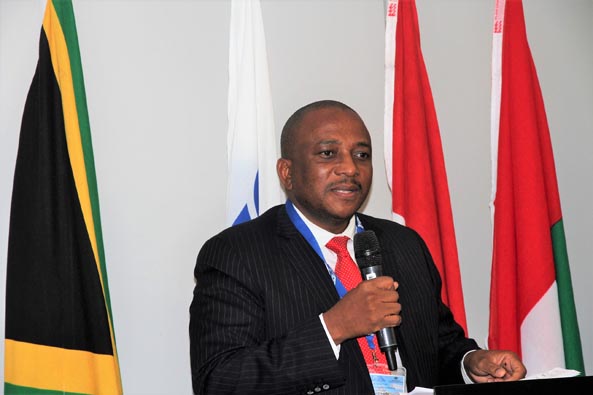Developing Countries should use IORA conference to respond to Anti-Globalisation Initiatives |
| The 22 countries that belong to the Indian Ocean Rim Association (IORA) should use the block’s two-day conference hosted by South Africa in Durban to discuss how to respond to the anti-globalisation initiatives that are arising from powerful countries of the world.
This was said by the Deputy Director-General of Special Economic Zones and Economic Transformation at the Department of Trade and Industry (the dti), Mr Sipho Zikode at the opening of the conference today. “This crucial conference comes at a time when we see new global developments affecting countries all over the world. For an example, we find ourselves in a situation where countries are using tariffs to develop the own economies and other countries responding to the new developments,” said Zikode. He added that the trade war between the United States of America and China was affecting many countries, particularly small developing countries like South Africa, whose export products like aluminium, have already been negatively affected. “This conference provides IORA members with an opportunity and a platform to sit down and discuss how to effectively respond to these anti-globalisation initiatives that are arising from some of the powerful countries of the world,” said Zikode. He added that IORA originated from the vision expressed by the late former President Nelson Mandela during his visit to India in 1995, for an economic cooperation between the countries bordering the Indian Ocean. “This conference brings to live the words of President Mandela for the creation of IORA to focus on those areas of economic cooperation that provide maximum opportunities for development, shared interest and mutual benefits. The objectives include promoting liberalisation, removing impediments and lowering barriers towards a freer and enhanced flow of goods, services, investment, and technology within the Indian Ocean Rim,” he added. He noted that the two-way trade in goods and services of the region amounted to $4.8 trillion in 2018. “The Intra-IORA trade represents only 2.5 percent of world trade. There is a need to improve the Intra-IORA trade through various initiatives including trade facilitation, trade policy coordination options, harmonisation and simplification of procedures, and dissemination of information through appropriate arrangements such as trade fairs, business-to-business meetings and capacity-building workshops,” advised Zikode. The Secretary- General of IORA, Dr Nomvuyo Nokwe said IORA’s share of world exports was 12% and share of world GDP was 10%, even though the block is home to 30% of the world’s population. “Today we will be privileged to hear from world class experts and business leaders from around our region on recent trade developments and emerging investment opportunities. I sincerely hope that this conference will certainly come up with some practical and implementable recommendations for trade modernising in IORA including custom harmonisation, intellectual property rights, standardisation and women’s empowerment through trade by strengthening SMEs,” said Nokwe.
Enquiries: |
MENUMENU
- Know the dtic
- Media Room
- Financial Assistance
-
-
- INCENTIVES
- 12I Tax Allowance Incentive
- Agro Processing Support Scheme (APSS)
- Aerospace Industry Support Initiative (AISI)
- Aquaculture Development and Enhancement Programme (ADEP)
- Automotive Investment Scheme (AIS)
- Black Industrialists Scheme (BIS)
- Capital Projects Feasibility Programme (CPFP)
- Critical Infrastructure Programme (CIP)
- Clothing, Textiles, Footwear and Leather Growth Programme (CTFLGP)
- Export Marketing and Investment Assistance (EMIA)
- Film Incentive
- INCENTIVES
-
- INCENTIVES
- Global Business Service (GBS)
- Innovation and Technology Funding instruments
- Manufacturing Competitiveness Enhancement Programme (MCEP)
- Production Incentive (PI)
- Manufacturing Support Programme (MSP)
- Sector Specific Assistance Scheme (SSAS)
- Strategic Partnership Programme (SPP)
- Support Programme for Industrial Innovation (SPII)
- Technology and Human Resource for Industry Programme (THRIP)
- Workplace Challenge Programme (WPC)
- Khoebo Innovation Promotion Programme (KIPP)
- INCENTIVES
-
-
- Sectors and Service
- Sectors
- B-BBEE
- Special Economic Zones
- Industrial Development
- Trade and Export
- Legislation and Business Regulation
- Bills and Acts
- Statutory Committees
- National Liquor Authority
- Proposed prohibition of the use of certain EU names
- Institutional Support for Business
- South African Council for Space Affairs
- InvestSA
- Non-Proliferation
- The South African Council For Space Affairs
- Procurement and Tenders
- Research and Statistics


